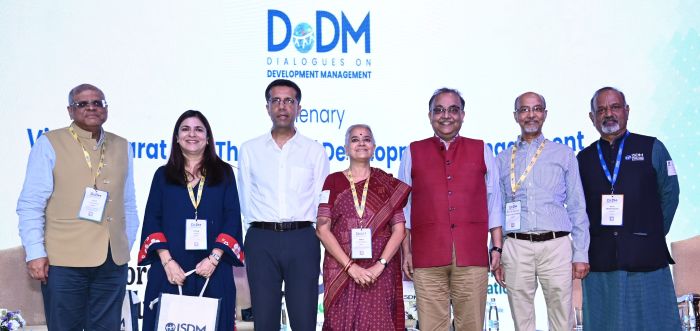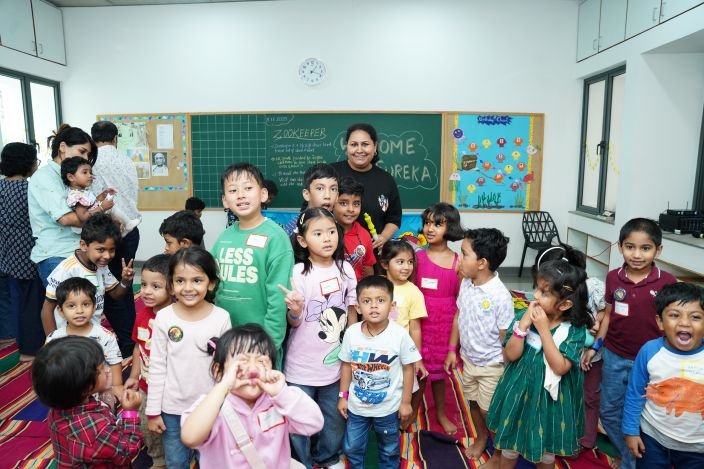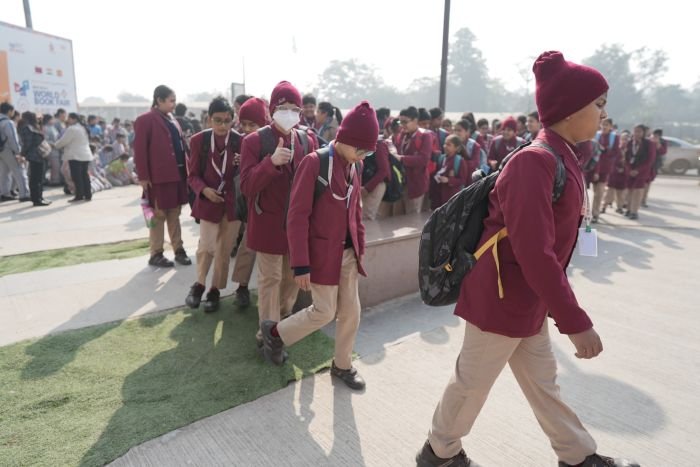
The Indian School of Development Management (ISDM) based in Noida hosted the third edition of its flagship conference, Dialogues on Development Management (DoDM) 2025, to explore how Social Purpose Organisations (SPOs) can shape the country’s journey to becoming a developed nation by 2047.
Held at the Dr. Ambedkar International Centre in New Delhi, the day-long conference brought together more than 80 thought leaders, 24 partner organisations, and hundreds of participants from across the development spectrum.
As India discusses ways and means to prepare for its 2047 milestone, DoDM 2025 reinforced the critical role of development management in shaping a resilient, inclusive, and future-ready nation. Themed “Advancing Viksit Bharat @ 2047 through Development Management”, the event went beyond conventional discussions on social impact, instead emphasising the structural and strategic aspects of managing organisations that work towards societal progress. Over 20 sessions were organised across four immersive tracks—the art and science of decision-making, strengthening the core for social change, financing the future of social change, and delivering social impact at scale. Together, they provided participants with frameworks to lead resilient organisations capable of driving sustained and inclusive impact.
The conference featured a distinguished roster of speakers, including Mirai Chatterjee, Director of SEWA; Ashish Dhawan, Founder-CEO of The Convergence Foundation; Amarjeet Sinha, Retired IAS and Senior Fellow at the Centre for Social and Economic Progress; Amit Chandra, Co-Founder of A.T.E. Chandra Foundation; and Sonia Singh, Founder-CEO of SSA India. These leaders brought diverse perspectives to the table, sharing not only visionary insights but also practical approaches to managing complex development challenges in an evolving socio-economic landscape.
Beyond panel discussions, DoDM 2025 fostered a collaborative environment where participants shared insights, built partnerships, and explored frameworks to strengthen the development ecosystem. The conference underscored the need for professionalised management practices to help SPOs deliver measurable impact at scale, while aligning growth with sustainability and social equity.
Ashish Dhawan, in his keynote address, stressed the importance of innovative and sustainable financing. “A $10 trillion-plus economy is more than scale—it’s about building bold, resilient infrastructure underpinned by steady investments in human capital and innovation. At DoDM 2025, our focus was on exploring scalable financial models that blend private-sector rigour with social purpose, which have the power to unlock the full potential of India’s demographic dividend while honouring our environmental commitments,” he said.
India’s ambitious goal of becoming a developed nation by 2047 demands not only economic growth but also an inclusive and equitable distribution of opportunities. Ravi Sreedharan, Founder and Director of ISDM, spoke to this imperative. “India stands at a critical juncture in its growth journey. To achieve the vision of a developed nation by 2047, our GDP must consistently accelerate from the current 6.5% levels to around 8%. But this cannot be growth for growth’s sake—it has to be underpinned by equal access to development capital, enabling innovation, entrepreneurship, and opportunities that uplift every segment of society. The future of Viksit Bharat depends on not just economic growth, but also making sure the gains reach every section of society, bridging urban-rural divides, and ensuring universal healthcare access for all Indians,” he said.
Echoing the call for an ethically driven approach, Amit Chandra added: “As India pursues universal literacy, healthcare access, and net-zero carbon emissions by 2070, development management can help us combine innovation with ethical stewardship. Addressing rising inequalities requires adaptive strategies that synergise collaboration, capacity building, and catalytic change, with compassion at the core of it.”
The track on decision-making emphasised the role of data-informed insights in improving organisational governance and delivery models. Another track focused on strengthening SPOs’ internal capacities, equipping them with leadership frameworks and operational resilience to navigate crises and scale impact sustainably. The financing sessions explored hybrid models that combine philanthropy, private capital, and innovative funding mechanisms to unlock resources for large-scale social transformation. Meanwhile, discussions on scaling impact examined case studies and strategies for replicating successful interventions across geographies and demographics without compromising quality or contextual relevance.








